七年级英语上册重要词汇讲解
- 格式:doc
- 大小:40.00 KB
- 文档页数:11
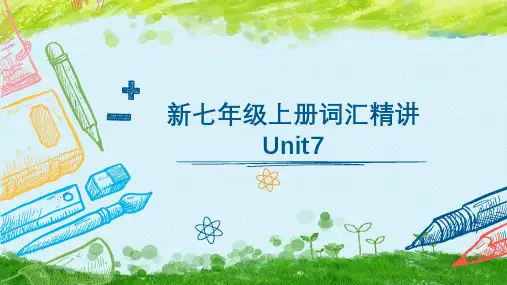
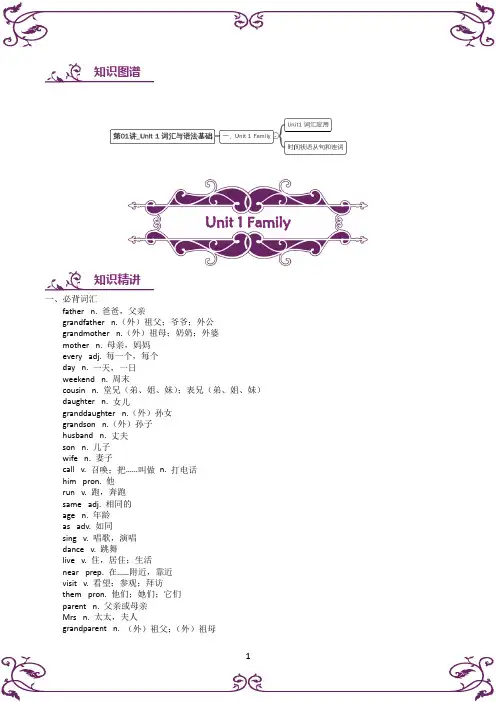
知识图谱Unit 1 Family知识精讲一、必背词汇father n. 爸爸,父亲grandfather n.(外)祖父;爷爷;外公grandmother n.(外)祖母;奶奶;外婆mother n. 母亲,妈妈every adj. 每一个,每个day n. 一天,一日weekend n. 周末cousin n. 堂兄(弟、姐、妹);表兄(弟、姐、妹)daughter n. 女儿granddaughter n.(外)孙女grandson n.(外)孙子husband n. 丈夫son n. 儿子wife n. 妻子call v. 召唤;把……叫做n. 打电话him pron. 他run v. 跑,奔跑same adj. 相同的age n. 年龄as adv. 如同sing v. 唱歌,演唱dance v. 跳舞live v. 住,居住;生活near prep. 在……附近,靠近visit v. 看望;参观;拜访them pron. 他们;她们;它们parent n. 父亲或母亲Mrs n. 太太,夫人grandparent n. (外)祖父;(外)祖母can v. 能,会;可以park n. 公园pretty adj.漂亮的;标致的short adj. 个字矮的,短的strong adj. 强壮的,强健的thin adj. 瘦的;薄的;细的young adj. 年轻的but conj. 而,但是……think v. 认为;想;思考pet n. 宠物clever adj. 聪明的leader n. 领导者;领袖basketball n. 篮球;篮球运动yum excl. 味道好,好吃hour n. 小时university n. 大学interest n. 兴趣;趣味v. 使感兴趣film n. 电影,影片soon adv. 很快,马上,不久else adv. 其他的;别的idea n. 主意,想法;看法whose det. 谁的food n. 食物bird n. 鸟world n. 世界二、重点词汇1. every determiner /ˈev.ri/1). used when referring to all the members of a group of three or more(3个或3个以上的人或事物组成的群体中的)每一个,每个;全部,整体例句:We’re open every day except Sunday.除了星期天我们每天都开门营业。
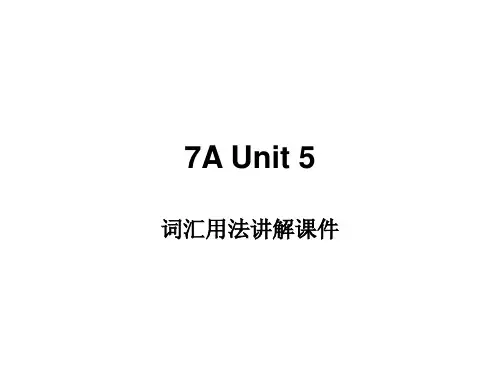
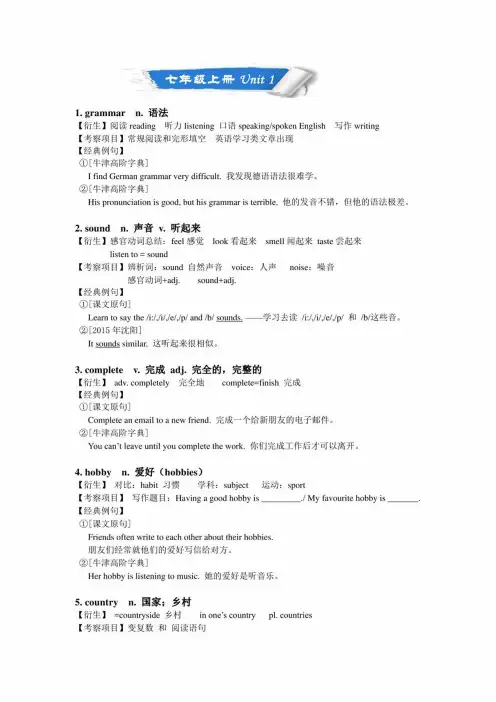
1. grammar n.语法【衍生】阅读reading听力listening口语speaking/spoken English写作writing【考察项目】常规阅读和完形填空英语学习类文章出现【经典例句】①[牛津高阶字典]I find German grammar very difficult.我发现德语语法很难学。
②[牛津高阶字典]His pronunciation is good,but his grammar is terrible.他的发音不错,但他的语法极差。
2.sound n.声音v.听起来【衍生】感官动词总结:feel感觉look看起来smell闻起来taste尝起来listen to=sound【考察项目】辨析词:sound自然声音voice:人声noise:噪音感官动词+adj.sound+adj.【经典例句】①[课文原句]Learn to say the/i:/,/i/,/e/,/p/and/b/sounds.------学习去读/i:/,/i/,/e/,/p/和/b/这些音。
②[2015年沈阳]It sounds similar.这听起来很相似。
plete v.完成adj.完全的,完整的【衍生】pletely完全地complete=finish完成【经典例句】①[课文原句]Complete an email to a new friend.完成一个给新朋友的电子邮件。
②[牛津高阶字典]You can't leave until you complete the work.你们完成工作后才可以离开。
4.hobby n.爱好(hobbies)【衍生】对比:habit习惯学科:subject运动:sport【考察项目】写作题目:Having a good hobby is./My favourite hobby is.【经典例句】①[课文原句]Friends often write to each other about their hobbies.朋友们经常就他们的爱好写信给对方。

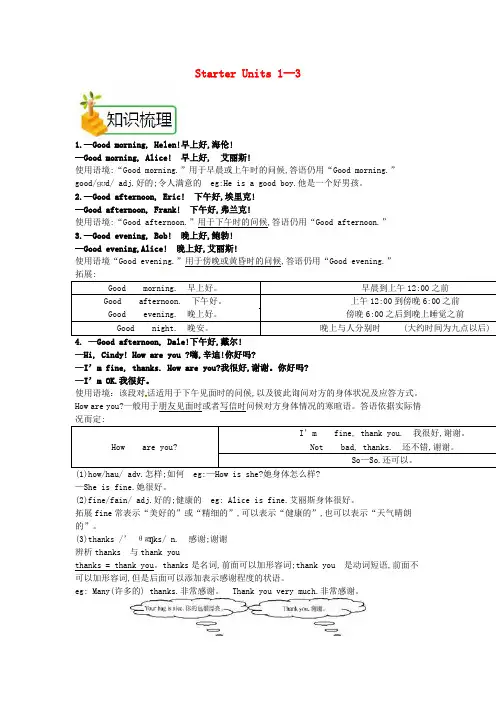
Starter Units 1--31.—Good morning, Helen!早上好,海伦!—Good morning, Alice! 早上好, 艾丽斯!使用语境:“Good morning.”用于早晨或上午时的问候,答语仍用“Good morning.”good/ɡʊd/ adj.好的;令人满意的eg:He is a good boy.他是一个好男孩。
2.—Good afternoon, Eric! 下午好,埃里克!—Good afternoon, Frank! 下午好,弗兰克!使用语境:“Good afternoon.”用于下午时的问候,答语仍用“Good afternoon.”3.—Good evening, Bob! 晚上好,鲍勃!—Good evening,Alice! 晚上好,艾丽斯!使用语境“Good evening.”用于傍晚或黄昏时的问候,答语仍用“Good evening.”拓展:Good morning. 早上好。
早晨到上午12:00之前Good afternoon. 下午好。
上午12:00到傍晚6:00之前Good evening. 晚上好。
傍晚6:00之后到晚上睡觉之前Good night. 晚安。
晚上与人分别时 (大约时间为九点以后) 4. —Good afternoon, Dale!下午好,戴尔!—Hi, Cindy! How are you ?嗨,辛迪!你好吗?—I’m fine, thanks. How are you?我很好,谢谢。
你好吗?—I’m OK.我很好。
使用语境:该段对话适用于下午见面时的问候,以及彼此询问对方的身体状况及应答方式。
How are you?一般用于朋友见面时或者写信时问候对方身体情况的寒暄语。
答语依据实际情况而定:How are you? I’m fine, thank you. 我很好,谢谢。
Not bad, thanks. 还不错,谢谢。
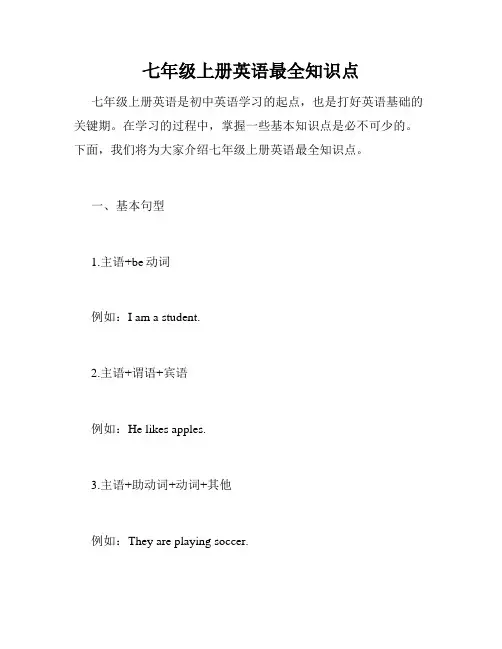
七年级上册英语最全知识点七年级上册英语是初中英语学习的起点,也是打好英语基础的关键期。
在学习的过程中,掌握一些基本知识点是必不可少的。
下面,我们将为大家介绍七年级上册英语最全知识点。
一、基本句型1.主语+be动词例如:I am a student.2.主语+谓语+宾语例如:He likes apples.3.主语+助动词+动词+其他例如:They are playing soccer.二、重要词汇1.人称代词例如:I, you, he, she, it, we, they.2.数字例如:one, two, three, four, five, six, seven, eight, nine, ten.3.颜色例如:red, blue, green, yellow, black, white, pink.4.家庭成员例如:father, mother, brother, sister, grandparents.三、重要语法1.一般现在时态例如:I play soccer every day.2.名词的复数形式例如:book-books, pen-pens, apple-apples.3.物主代词例如:mine, yours, his, hers, its, ours, theirs.4.人称代词的主格与宾格例如:I-me, you-you, he-him, she-her, it-it, we-us, they-them.四、其他重要知识点1.时间例如:in the morning, in the afternoon, in the evening, at night.2.地点例如:at school, at home, in the park, on the road.3.动词的-ing形式例如:play-playing, eat-eating, talk-talking.4.情态动词例如:can, could, may, might, should, must.以上就是七年级上册英语的最全知识点,希望对大家有所帮助。
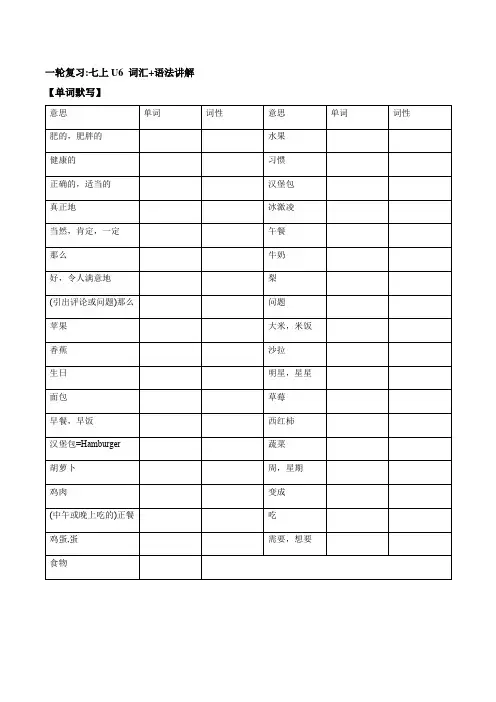
一轮复习:七上U6 词汇+语法讲解【单词默写】【单词变性】healthy形容词变名词______________ really副词变形容词______________ well副词变形容词______________ week名词变形容词______________1. well ______________ _____________________ ___________________ ________________Well, let’s talk about it next time.Mary does well in English.I don't feel very well today.You can get water in the well.2. right ______________ _____________________ ___________________ ________________ ______________ Everyone has his own rights in the society.Yes, that’s right.All right, let’s go to the cinema.I’m sorry. That’s all right.I sit on the right of Mary while Mary sits on the left of me.3. then __________ ___________Till then, everything is too late.First, you put the meat into the pot. Then, mix it with water.4. question ________________ ________________I have many questions to ask my teacher.I was questioned by a policeman about the murder last night.5. want ________________ ________________I want to stay at home because of the rain.You are wanted to be a volunteer.The thief was wanted on the web.Do you want something to drink?【词汇用法】1. sure: adv./adj./be sure to do sth./be sure that…/make sure that…/make sure to do sth.2. so: adv./conj./so adj./adv. that/so that/so as to/not as adj./adv. so/I think so/I hope so.相关词辨析: because vs. sobecause: conj./因为/不与so连用so: conj./所以/不与because 连用3. habit: n./develop a habit of/break a habit of/good habits/bad habits近义词辨析: habit vs. custom vs. culturehabit: n./习惯custom: n./习俗culture: n./文化4. be: v./be+Adj./be+done/be+n./be+to do/be +doing/be +PP(prep. Phrase)5. eat: vt./eat sth./eat up近义词辨析: have vs. eathave: vt./have lunch(享用一餐)eat: vt./eat rice(享用具体的东西)【攻占语法】动词(二) 实义动词一、动词的分类: ____________ _____________ _____________ ______________二、动词的位置: 在句中充当_____________, 放在___________ 的前面或_____________的后面三、动词的用法:2. 实义动词1) 感官动词look/sound/taste/smell/feel +adj.2) 感观动词watch/see/hear/observe sb. do/doing sth.3) 使役动词make/let/have sb. do sth.get sb. to do sth.make sb./sth. donehave sth. donehave sth. doingget sb./sth. done4) 及物动词动词+名词5) 不及物动词动词单独使用动词+介词+名词请在及物动词的框内打”√”,不及物动词的框内打”×”□ask□buy □call□come □eat□excuse □find □finish □get□go□have□know□let□like□look□lose□meet□need□play□say□see□sell□sound□spell□take□thank□think□want□watch□help□love6) 双宾语动词动词+间接宾语+直接宾语动词+直接宾语+to/for +间接宾语请在是双宾语动词的框内打”√”□teach □learn □buy□sell□order □lend □borrow □dress□bring□take□send□give□tell□pay□hand□show□offer□read□pass□help□want【词汇练习】1.Amy usually eats an a ________ after lunch because it's her favorite fruit.2.Let’s think about some food for Henry’s b ________ party.3.For b ________ I have a glass of milk and some bread. They are healthy.4.Potatoes, c ________, and cabbages are vegetables my son likes best.5.We always have rice, chicken and salad for d________.6.I want to know something about David, the volleyball star's e________ habit.7.I have e________ for breakfast every day.8.Judy likes eating sweet food and doesn’t like doing sports. As a result, she becomes f ________ and unhealthier.9.Eggs, milk and strawberries are all healthy f________.10.I eat f ________ and vegetables every day, which are good for my health.11. A good study h ________ will help you learn English well.12.Tom ate a big breakfast. He had a h ________, an egg and milk.13.Do you want to be h _______? Then you need to eat well and do sports every day.14.All the students have l________ at school from Monday to Friday.15.I can’t answer this q ________. It’s too difficult.16.I like English very much. It's r________ easy.17.I need some vegetables, fruits and yogurt to make fruit s ________.18.He doesn’t want to be late for school again, s ________ he eats quickly and runs to school.19.For fruit, Jack likes apples and s________.20.—Can you come to my party?—That’s for s _______.21.I want a bowl of t ________ noodles, because I like vegetables very much.22.Eat more v ________ and less meat, then you will be healthier.23.We have five English classes a w________.24.It is w________ known that Hangzhou is a perfect city for sightseeing.25.Please come to our club, you are w ________ to join us!【参考答案】healthy形容词变名词health really副词变形容词real well副词变形容词good week名词变形容词weekly1. well 好吧擅长感觉舒服井Well, let’s talk about it next time.Mary does well in English.I don't feel very well today.You can get water in the well.2. right 权力对的好吧没关系右边Everyone has his own rights in the society.Yes, that’s right.All right, let’s go to the cinema.I’m sorry. That’s all right.I sit on the right of Mary while Mary sits on the left of me.3. then 那时然后Till then, everything is too late.First, you put the meat into the pot. Then, mix it with water.4. question 问题询问I have many questions to ask my teacher.I was questioned by a policeman about the murder last night.5. want 想应聘通缉想要I want to stay at home because of the rain.You are wanted to be a volunteer.The thief was wanted on the web.Do you want something to drink?一、动词的分类: be 动词情态动词助动词实义动词二、动词的位置: 在句中充当谓语,放在主语的前面或宾语的后面三、动词的用法:请在及物动词的框内打”√”,不及物动词的框内打”×”√ask√buy √call×come √eat√excuse √find √finish √get×go√have√know√let√like×look√lose√meet√need√play√say√see√sell×sound√spell√take√thank×think√want√watch√help√love6) 双宾语动词动词+间接宾语+直接宾语动词+直接宾语+to/for +间接宾语请在是双宾语动词的框内打”√”√teach □learn √buy √sell √order √lend□borrow□dress√bring□take√send√give√tell√pay√hand√show √offer √read√pass□help□want【词汇练习】apple birthday breakfast carrots dinner eating eggs fatter food fruits habit hamburger healthy lessons question really salad so strawberries sure tomato vegetables week well。
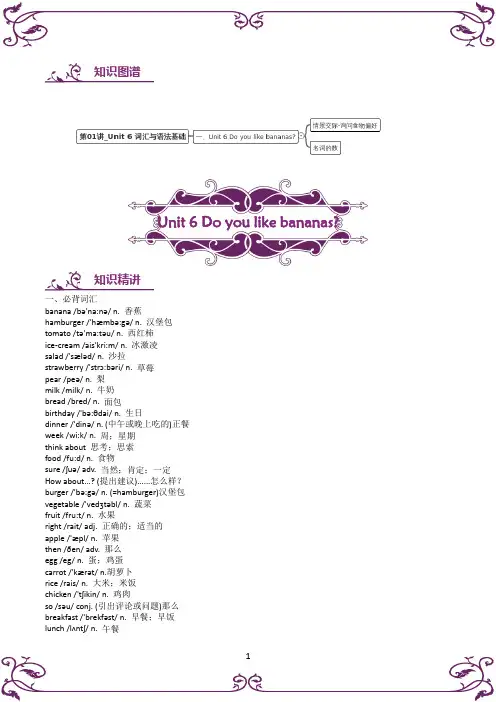
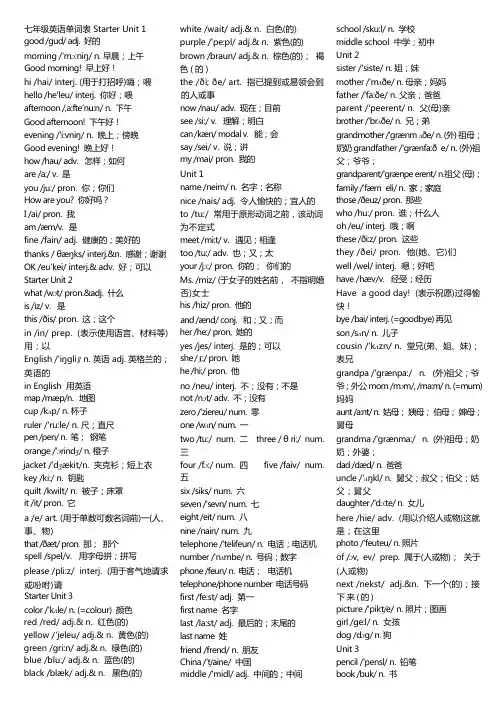
七年级英语单词表 Starter Unit 1 good /gud/ adj. 好的morning /'mɔ:niŋ/ n. 早晨;上午Good morning! 早上好!hi /hai/ interj. (用于打招呼)嗨;喂hello /he'leu/ interj. 你好;喂afternoon /,a:fte'nu:n/ n. 下午Good afternoon! 下午好!evening /'i:vniŋ/ n. 晚上;傍晚Good evening! 晚上好!how /hau/ adv. 怎样;如何are /a:/ v. 是you /ju:/ pron. 你;你们How are you? 你好吗?I /ai/ pron. 我am /æm/v. 是fine /fain/ adj. 健康的;美好的thanks / θæŋks/ interj.&n. 感谢;谢谢OK /eu'kei/ interj.& adv. 好;可以Starter Unit 2what /wɔt/ pron.&adj. 什么is /iz/ v. 是this /ðis/ pron. 这;这个in /in/ prep. (表示使用语言、材料等) 用;以English /'iŋgli n. 英语 adj. 英格兰的;英语的in English 用英语map /mæp/n. 地图cup /kʌp/ n. 杯子ruler /'ru:le/ n. 尺;直尺pen /pen/ n. 笔;钢笔orange /'ɔrindʒ/ n. 橙子jacket /'dʒækit/n. 夹克衫;短上衣key /ki:/ n. 钥匙quilt /kwilt/ n. 被子;床罩it /it/ pron. 它a /e/ art. (用于单数可数名词前)一(人、事、物)that /ðæt/ pron. 那;那个spell /spel/v. 用字母拼;拼写please /pli:z/ interj. (用于客气地请求或吩咐)请Starter Unit 3color /'kʌle/ n. (=colour) 颜色red /red/ adj.& n. 红色(的) yellow /'jeleu/ adj.& n. 黄色(的) green /gri:n/ adj.& n. 绿色(的) blue /blu:/ adj.& n. 蓝色(的) black /blæk/ adj.& n. 黑色(的) white /wait/ adj.& n. 白色(的)purple /'pe:pl/ adj.& n. 紫色(的)brown /braun/ adj.& n. 棕色(的);褐色(的)the /ði; ðe/ art. 指已提到或易领会到的人或事now /nau/ adv. 现在;目前see /si:/ v. 理解;明白can /kæn/ modal v. 能;会say /sei/ v. 说;讲my /mai/ pron. 我的Unit 1name /neim/ n. 名字;名称nice /nais/ adj. 令人愉快的;宜人的to /tu:/ 常用于原形动词之前,该动词为不定式meet /mi:t/ v. 遇见;相逢too /tu:/ adv. 也;又;太your /jɔ:/ pron. 你的;你们的Ms. /miz/ (于女子的姓名前,不指明婚否)女士his /hiz/ pron. 他的and /ænd/ conj. 和;又;而her /he:/ pron, 她的yes /jes/ interj. 是的;可以she /:/ pron. 她he /hi:/ pron. 他no /neu/ interj. 不;没有;不是not /nɔt/ adv. 不;没有zero /'ziereu/ num. 零one /wʌn/ num. 一two /tu:/ num. 二three / θ ri:/ num.三four /fɔ:/ num. 四 five /faiv/ num.五six /siks/ num. 六seven /'sevn/ num. 七eight /eit/ num. 八nine /nain/ num. 九telephone /'telifeun/ n. 电话;电话机number /'nʌmbe/ n. 号码;数字phone /feun/ n. 电话;电话机telephone/phone number 电话号码first /fe:st/ adj. 第一first name 名字last /la:st/ adj. 最后的;末尾的last name 姓friend /frend/ n. 朋友China /'tʃaine/ 中国middle /'midl/ adj. 中间的;中间school /sku:l/ n. 学校middle school 中学;初中Unit 2sister /'siste/ n. 姐;妹mother /'mʌðe/ n. 母亲;妈妈father /'fa:ðe/ n. 父亲;爸爸parent /'peerent/ n. 父(母)亲brother /'brʌðe/ n. 兄;弟grandmother /'grænm ʌðe/ n. (外) 祖母;奶奶grandfather /'grænfa:ð e/ n. (外)祖父;爷爷;grandparent/'grænpe erent/ n.祖父 (母);family /'fæm eli/ n. 家;家庭those /ðeuz/ pron. 那些who /hu:/ pron. 谁;什么人oh /eu/ interj. 哦;啊these /ði:z/ pron. 这些they /ðei/ pron. 他(她、它)们well /wel/ interj. 嗯;好吧have /hæv/v. 经受;经历Have a good day! (表示祝愿)过得愉快!bye /bai/ interj. (=goodbye) 再见son /sʌn/ n. 儿子cousin /'kʌzn/ n. 堂兄(弟、姐、妹);表兄grandpa /'grænpa:/ n. (外)祖父;爷爷;外公 mom /mɔm/, /ma:m/ n. (=mum)妈妈aunt /a:nt/ n. 姑母;姨母;伯母;婶母;舅母grandma /'grænma:/ n. (外)祖母;奶奶;外婆;dad /dæd/ n. 爸爸uncle /'ʌŋkl/ n. 舅父;叔父;伯父;姑父;舅父daughter /'dɔ:te/ n. 女儿here /hie/ adv. (用以介绍人或物)这就是;在这里photo /'feuteu/ n. 照片of /ɔv, ev/ prep. 属于(人或物);关于(人或物)next /nekst/ adj.&n. 下一个(的);接下来(的)picture /'piktʃe/ n. 照片;图画girl /ge:l/ n. 女孩dog /dɔg/ n. 狗Unit 3pencil /'pensl/ n. 铅笔book /buk/ n. 书eraser /i'reize/ n. 橡皮box /baks/ n. 箱;盒pencil box 铅笔盒;文具盒schoolbag /'sku:lbæg/ n. 书包dictionary /'dikʃeneri/ n. 词典;字典his /hiz/ pron. 他的mine /main/ pron. 我的hers /he:z/ pron. 她的excuse /ik'skju:z/ v. 原谅;宽恕me /mi:/ pron. (I 的宾格)我excuse me 劳驾;请原谅thank / θæŋk/v. 感谢;谢谢teacher /'ti:tʃe/ n. 老师;教师about //e'baut/ prep. 关于What about...?(询问消息或提出建议 .. 怎么样?yours /jc:z/ pron. 你的;你们的for /fc:/ prep. 为了;给;对thank you for... 为......而感谢help /help/ v.&n. 帮助;援助welcome /'welkem/ adj. 受欢迎的You're welcome. 别客气。
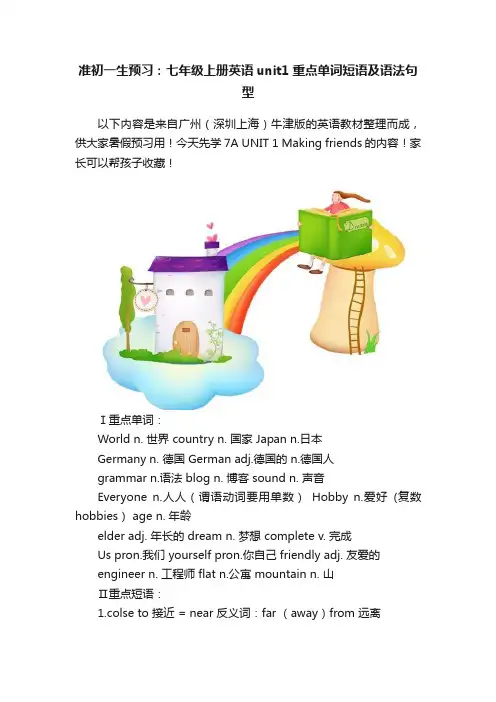
准初一生预习:七年级上册英语unit1重点单词短语及语法句型以下内容是来自广州(深圳上海)牛津版的英语教材整理而成,供大家暑假预习用!今天先学7A UNIT 1 Making friends的内容!家长可以帮孩子收藏!Ⅰ重点单词:World n. 世界 country n. 国家 Japan n.日本Germany n. 德国 German adj.德国的 n.德国人grammar n.语法 blog n. 博客 sound n. 声音Everyone n.人人(谓语动词要用单数)Hobby n.爱好(复数hobbies) age n. 年龄elder adj. 年长的 dream n. 梦想 complete v. 完成Us pron.我们 yourself pron.你自己 friendly adj. 友爱的engineer n. 工程师 flat n.公寓 mountain n. 山Ⅱ重点短语:1.colse to 接近 = near 反义词:far (away)from 远离2.Go to school 去上学3.Be good at 擅长 =do well in 反义词:be bad /poor at=do badly in不擅长4.Make friends with 与……交朋友 make friends 交朋友5.All over 遍及6.I’d like to=would like to 愿意Ⅲ重点句型:1.what does···mean?2.welcome to3.I like···because···4.My dream is to be··?5.How old is/are ····?6.What does ····do?详细讲解:1.Read a German girl’s blog。
Starter Unit1good [gud] adj.good [gud] adj.好的morning ['mɔ:niŋ] n.早晨;上午Good morning! 早上好!hi [hai] interj.(用于打招呼)嗨;喂hello ['hə'ləu] interj.你好;喂afternoon ['ɑ:ftə'nu:n] n.下午Good afternoon! 下午好!evening ['i:vniŋ] n.晚上;傍晚Good evening! 晚上好!how [hau] adv.怎样;如何are [ɑ:] v.是you [ju:, ju] pron.你;你们How are you? 你好吗?I [ai] pron.我am [æm, əm] v.是fine [fain] adj.健康的;美好的thanks interj.n.感谢;谢谢OK ['əu'kei] interj.adv.好;可以HB (铅笔芯)硬黑CD 光盘;激光唱片BBC 英国广播公司Alice ['ælis] 爱丽丝(女名)Bob [bɔb] 鲍勃(男名)Cindy 辛迪(女名)Dale [deil] 戴尔(男名)Eric ['erek] 埃里克 (男名)Frank [fræŋk] 弗兰克(男名)Grace [greis] 格雷丝(女名)Helen ['helin] 海伦(女名)Starter Unit2what /wɔt/ pron.&adj. 什么is /iz/ v. 是this /ðis/ pron. 这;这个in /in/ prep. (表示使用语言、材料等)用;以English /'iŋgliʃ/ n. 英语adj. 英格兰的;英语的in English 用英语map /mæp/ n. 地图cup /kʌp/ n. 杯子ruler /'ru:lə/ n. 尺;直尺pen /pen/ n. 笔;钢笔orange /'ɔrindʒ/ n. 橙子jacket /'dʒækit/ n. 夹克衫;短上衣key /ki:/ n. 钥匙quilt /kwilt/ n. 被子;床罩it /it/ pron. 它a /ə/ art. (用于单数可数名词前)一(人、事、物) that /ðæt/ pron. 那;那个spell /spel/ v. 用字母拼;拼写please /pli:z/ interj. (用于客气地请求或吩咐)请Starter Unit3color /'kʌlə/ n. (=colour) 颜色red /red/ adj.& n. 红色(的)yellow /\'jeləu/ adj.& n. 黄色(的)green /gri:n/ adj.& n. 绿色(的)blue /blu:/ adj.& n. 蓝色(的)black /blæk/ adj.& n. 黑色(的)white /wait/ adj.& n. 白色(的)purple /\'pə:pl/ adj.& n. 紫色(的)brown /braun/ adj.& n. 棕色(的);褐色(的)the /ði; ðə/ art. 指已提到或易领会到的人或事now /nau/ adv. 现在;目前see /si:/ v. 理解;明白can /kæn/ modal v. 能;会say /sei/ v. 说;讲my /mai/ pron. 我的02Starter Unit 1-3 知识梳理【重点短语】1. good morning/afternoon/evening 早上/下午/晚上好2. good night 晚安3. thank you = thanks 谢谢你4. in English 用英语5. CD 光盘,激光唱片6. BBC 英国广播公司7. NBA (美国)全国篮球协会8. P 停车场,停车位9. kg 千克,公斤10. S 小号的11. M 中号的12. L 大号的13. UFO 不明飞行物【重点句型】1. —Hi, Helen! How are you? 嗨,海伦!你好吗?—Hi, Eric! I'm fine,thanks. 嗨,埃里克!我很好,谢谢。
Units 1—2 重要词汇讲解 1. thanks thanks是名词,常以复数形式出现。 【拓展】 thank是thanks的动词形式,不能单独使用,后面要接宾语。如: Thank you. 谢谢你。 如果表示特别感谢,就要加重语气,用Thank you very much. / Thanks a lot. / Many thanks. 表示“多谢”。 2. please please用作动词,意为“请、请求;劳驾”,常用于一些客气的场合中,可放在句首,也可放在句末,不过此时前面常用逗号与前一个句子隔开。如: Please come in. / Come in, please. 请进! please也可用于祈使句或疑问句中表示礼貌或客气。如: Please stand up. / Stand up, please. 请起立。 3. good, fine, OK good, fine, OK这几个词都意为“好”,它们可是各有所“好”哦,请看它们的自我展示吧! Hello, 我是good,我有许多用法。请看: (1)“好的;优质的”,多用于修饰物。如: This is a good book. 这是一本好书。 (2)“善良的”,多用于指人。如: Alice is a good girl. 艾丽斯是个好女孩。 (3)“令人满意的;令人愉快的”,多用于指物。如: It’s a good day. 今天是个好天气。 (4) 可用于问候语中。如: Good morning / afternoon / evening! 早上 / 下午 / 晚上好! Hi! 我是fine,常用作形容词,我的用法也很多: (1) “身体健康的”。如: —How are you? 你好吗? —I’m fine, thank you. 我很好,谢谢。 (2) “好看的;漂亮的”。如: It is a fine picture. 它是一幅漂亮的图画。 (3) “天气晴朗的”。如: It’s a fine day. 天气不错。 我叫OK,是形容词,意为“好;不错”。表示身体好时,相当于fine。如: —How are you, Bob? 鲍勃,你好吗? —I’m OK. 我很好。 【拓展】我还可以作副词,表示同意,意为“可以;行”。如: —Let’s go. 咱们走吧。 —OK. 行。 Unit 3重要词汇讲解
1. and and是连词,意为“和;又;而且”,表示并列或对称的关系。如: Cindy and Helen are girls. 辛蒂和海伦是女孩。 She is tall and nice. 她又高又好看。 当and连接两个或两个以上表示颜色的词时,表示两(几)种颜色相间的。如: The cat is white and yellow. 这只猫是黄白相间的。 and用于加法运算中,意为“加”。如: —What’s two and three? 二加三等于几? —It’s five. 等于五。 [特别提醒] 当and连接两个名词或代词作主语时,谓语动词be要用复数形式are。如: The ruler and the pen are green. 那把直尺和那支钢笔是绿色的。 You, he and I are in the same class. 你、我和他在同一个班里。 2. color color用作名词,意为“颜色”。 color是表示单一颜色名词的总称,包括red, green, yellow, blue, white, black, brown(棕的), orange(橙的), purple (紫的), grey (灰的)等,这些表示颜色的形容词不能和colo同时使用。如: [误] It’s white color. [正] It’s white. 表示颜色的单词后面没有名词时,前面也不能用冠词a / an。 [误] The bag is a red. [正] The bag is red. [正] It’s a red bag. [拓展] color可用作动词,意为“给……涂颜色;着色”,后可接名词或代词作宾语。如: Color it. 给它涂上颜色。 Color the map green, please. 请把这幅地图涂成绿色。 注意:一些表示颜色的词,其首字母大写时,可用来表示姓氏。如: Black 布莱克, Green 格林, White怀特, Brown布朗等。 (相关练习见E面“词语追踪”) Unit 4重要词汇讲解
know 作动词,①意为“知道;了解”。如: The boy knows English. 这个男孩儿懂英语。 I don’t know. 我不知道。 ②意为“认识”。如: I know your brother. 我认识你的弟弟。 [拓展] know的同音异形词为no。 need 作动词,意为“需要”,后可接名词、代词或动词不定式(to do)等。如: I need a notebook. 我需要一本笔记本。 She needs him. 她需要他。 You need to bring your hat here. 你需要把你的帽子带来。 [注意] need用作实义动词时,有时态、人称和数的变化,变否定句和疑问句时要加助动词do或does。如: Here is a dictionary. Do you need it? 这里有一本字典。你需要它吗? I don’t need this color. 我不需要这种颜色。 need作名词,意为“需要;需求”。如: a friend in need 患难之交 take 作动词,意为“拿走;带走”, 指从说话者处带走,由近及远,常和介词to, with连用。如: Please take these books to the classroom. 请把这些书带到教室去。 [链接] bring bring作动词,意为“带来;拿来”,指把某物带到说话者处,由远及近,与take相对。如: Bring your friends with you, please. 请把你的朋友带来。 [固定用法] 把某物带给某人:bring + sb. + sth. / bring + sth. + for + sb.。如: Bring me the blue pen. = Bring the blue pen for me. 把那支蓝色的钢笔带给我。 Unit 5重要词汇讲解
have have作动词,意为“有”,强调“所属关系”,其第三人称单数形式是has。如: I have a new computer. 我有一台新电脑。 He has a blue bike. 他有一辆蓝色的自行车。 [拓展] have的其他用法: 1. 意为“吃;喝”,与表示一日三餐、食品、饮料等的名词或代词连用。如: I want to have a cup of juice. 我想喝一杯果汁。 2. 意为“从事;进行”。如: have a look看一看;have a walk散步; have a swimming游泳 3. 意为“借用”。如: May I have your pen? 我可以借用一下你的钢笔吗? 4. 意为“买”。如: Let’s go and have some tea. 咱们去买些茶吧。 5. 意为“邀请”。如: Thanks for having me to your party. 谢谢你邀请我参加你的聚会。 play 作动词。 1. 意为“玩;玩耍”。如: play games 玩游戏 2. 意为“打(踢)球”。play后接球类或游戏类名词时,名词前一般不加任何冠词。如: play basketball打篮球 play computer games 玩电脑游戏 3. 意为“演(弹、吹)奏”。play后接各种乐器类名词时,名词前要加定冠词the。如: play the piano弹钢琴 作名词,意为“戏剧;游戏”。如: an interesting TV play一部有趣的电视剧 watch 作动词,意为“观看;注视”。如: watch TV 看电视 watch a football match观看一场足球赛 作名词,意为“手表”。如: Do you have a watch like this? 你有一块这样的手表吗? sound 作系动词,意为“听起来……”,后常接形容词,表示某种情况或状况。如: The music sounds beautiful. 这音乐听起来很美。 —Let’s play basketball. 让我们打篮球吧! —It sounds good. 听起来不错。 作名词,意为“声音”。如: the sound of running water 流水声 [拓展] sound还经常与介词like构成短语sound like“听起来像……”。如: The music sounds like the singing of birds. 那乐曲听起来像鸟儿在唱歌。 interesting 作形容词,意为“有趣的;令人感兴趣的”,在句中可作定语(放在名词前)或表语(放在系动词be / sound等后)。如: This is an interesting storybook. 这是一本有趣的故事书。 This storybook is very interesting. 这本故事书很有趣。 [链接] interested 两者都是形容词。 interesting可作表语或定语,修饰的中心词常是能引起人们兴趣的名词或代词,常用来修饰物。 interested作表语,强调“某人对……感兴趣”。 Unit 6重要词汇讲解
你“喜欢”“吃”“橙子”吗? like 作动词,表示喜好,意为“喜欢”,常用表达有:like sb. / sth. 喜欢某人/某事;like doing / to do sth. 喜欢做某事。如: –What do you like? 你喜欢什么? –I like apples. 我喜欢苹果。 Anna doesn’t like (having) salad. 安娜不喜欢(吃)沙拉。 I don’t like to play / playing soccer. 我不喜欢踢足球。 [拓展] like也可作介词,意为“像(某人或某物);相似;类似”。 常见表达;be like“像……”; look like“看起来像”;如: Look! The hat is like a cat. 瞧!这帽子像一只猫。 You look like your mother. 你看起来像你的妈妈。 eat 作动词,意为“吃”。如: eat breakfast 吃早餐;